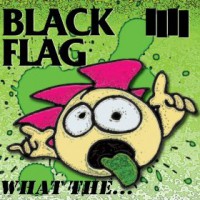
Black Flag
What The... (2013)
John Gentile
First, to say that What The⦠doesn't "sound" like a Black Flag album makes no sense. Since the band's very inception, they have consistently bucked what came before them, challenging their fans and their fandom in the process. When second and now most recent but also now ex-vocalist Ron Reyes replaced Keith Morris for 1980's Jealous Again, the punk community criticized the band for losing Morris' snarl. When fourth vocalist Henry Rollins replaced third vocalist Dez Cadena, the band was criticized for bringing in a more self-serious style in lieu of their former gleeful self-destruction. When they went slow and heavy on 1984's My War, the band was criticized for not replicating Damaged. Black Flag have no "one sound" because they've been in constant evolution since their inception, and to attack them for not sounding like like they did on Nervous Breakdown or Damaged misses the point entirely. Second, were this album released without any of the hoopla surrounding Black Flag/Ron Reyes/FLAG, then it would be hailed as a "worthy addition to the Black Flag catalogue" instead of the supposed abomination that it has been labeled as. Third, as with so many latter-era Black Flag records, it is severely undercooked.
Of course, the centerpiece of the album and controversy is founding member and lead guitarist Greg Ginn. Lately, Ginn has been getting a lot of heat for being petty and nasty. All that may be true, but music isn't to be judged on whether someone is "nice," but if they create captivating art. Without a doubt, Ginn is a guitar genius and the way he effortlessly writes incredible licks on What The⦠shows that he is still as sharp as he was on SST001.
Every riff on this 22 track album features Ginn at his most savage. He flies up and down the scales like a maestro, whipping between charging chords and mousetrap, explosive configurations. All at once his playing is fast, bestial, and most importantly, unpredictable. Plus, there is that wonderful, blues-gone-metal-gone-avant garde tone of his which is instantly identifiable. The ease with which he crafts these songs shows just how many light years he is beyond everyone else.
That being said, What The⦠sounds like it was meant to be an instrumental album with vocals chucked on top. In all of its original incarnations, Black Flag excelled in one aspect where almost every other punk band failed–space. Ginn knew exactly when to attack, back up, fade into the dark, and the explode back when least expected. But here, his jamming is relentless.
Reyes who sounds even better than he did on Jealous Again, his voice deeper, richer, and stronger but still with that manic surfer edge. But, he seems to constantly be trying to squeeze into these songs. Whereas, say, on "White Minority" or "Depression" the vocalist would storm in, then let Ginn's riffs raze the ground in a one-two attack, here, Ginn washes out Reyes' vocals with nonstop noise. There is simply too much crammed into these songs. Had Reyes been given room to deliver his lyrics, most of which are up there with the classic Black Flag snaps, these songs would have been some of the band's best–tight, 1:30 ragers that twist and turn. For instance, on "Lies," where Reyes does get some space, the tension, style, and menace of classic Black Flag appears as if it is as easy to do as flipping on a light switch. But instead, for the majority of the album, Ginn seems more intent on guitar exercises than actual songs.
Ginn has been criticized on the album for playing a theremin. That is a stupid opinion. Black Flag was never a band that enforced the "rules of punk." Rather, Black Flag constantly swiped at the chains being wrapped around them. Not only is Ginn's choice to play the theremin daring and inventive, but it is an unexpected way of throwing off the shackles of the modern definition of punk. To boot, Ginn seems to be such an unrelenting taskmaster that he plays the theremin with the skill of a master and the instrument adds a marvelous, eerie quality to the band which if anything, reinforces its image as one of danger, invention and unpredictability. Plus, you know, just playing a theremin is pretty cool in of itself.
It's easy to want to hate this album, because it was birthed in such controversy and also may offend an intangible notion of the band's values which no one can ever seem to quite define or state what is being violated (not to mention, the band themselves never agreed to that pact to begin with.) But, when on tracks like "Outside," where Ginn bends out his fabulously sharp, teethed, ominous riffs, and where he allows Reyes to howl out in that beach bum gone berserk voice of his, the band reach the subliminal heights of their original run. In those fleeting moments, Black Flag are once again the greatest punk band ever. But, they are all too fleeting. If only the band had spent a little time more working on composition and less on jammingâ¦
Notes:
-People have been unduly hash on the album cover. Reyes made it, and in his defense, when he originally designed it, he didn't know that it would be in color and didn't even know the image would be the cover. You don't have to like it, but remember, there are people behind this art and no one is making Beyonce money here- let's try to remain at least human in our criticisms, yes?
-The Ducky Boys do back up vocals on this… What?!